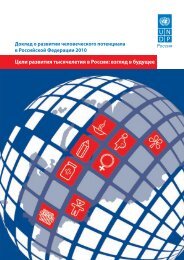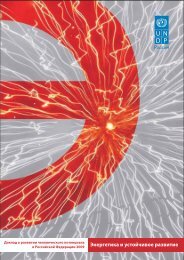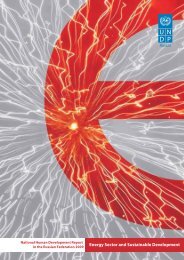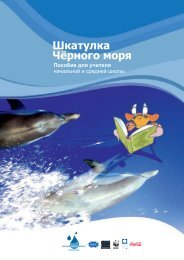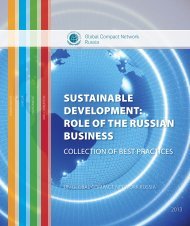Report - UNDP Russia
Report - UNDP Russia
Report - UNDP Russia
Create successful ePaper yourself
Turn your PDF publications into a flip-book with our unique Google optimized e-Paper software.
market, and there was a reduction of bothconsumer and investment demand.By summer 2009 world demand forenergy was still much lower than in 2008 (Figure1.2). <strong>Russia</strong>’s exports of oil and (to an even greaterextent) natural gas diminished as a result. Gasexports were down by more than 40% at the endof H1 2009 compared with H1 2008, although thefall was partly due to the Ukrainian gas transitproblem in January. However, OPEC’s successfulpolicy for reducing supply (by almost 4 millionbarrels per day) enabled oil prices to stabilize at arelatively high level in historical terms. This givesground for optimism, but forecasts of leadinginternational analysts for <strong>Russia</strong>’s economicgrowth rates through the crisis period remainvery cautious. The IMF estimates that <strong>Russia</strong> wasamong 15 countries, which suffered most duringthe acute phase of the crisis (in 2009).1.3. The role and place of the fueland energy sector in <strong>Russia</strong>’seconomy. Current state ofthe sector and potentialfor modernizationStable international demand for oil is akey factor enabling <strong>Russia</strong> to overcome effects ofthe crisis (<strong>Russia</strong>n oil export volumes haveremained flat) and the ‘price per barrel’ remainshighly important for macroeconomic prospects:such is the importance of the fuel & energy sectorfor the national economy. The fuel & energysector is the biggest source of budget income.The sector provided 43% 1 of all federal budgetearnings in 2008, and should have representedthe same share of the 2009 budget, according tothe draft approved in the fall of 2008 2 . Due to thecrisis and its effect on the energy markets, therevised version of the budget, approved in April2009, reduced the share of energy revenues to30.6% 3 . Oil & gas revenues include mineralextraction tax, as well as export duties for oil, oilproducts and natural gas. Actual budgetrevenues from the oil & gas sector, includingincome tax of oil companies, VAT, excise fees andother charges are substantially higher.<strong>Russia</strong>’s extraction sector has become afocus for foreign investments, attracting 15-20%of annual capital investment from abroad in themid–2000s. Leading world oil & gas companies(BP, Shell, ConocoPhillips and others) havebecome involved. Measured by its relative size,mineral resource extraction (mainly energy) is theleading sector in the <strong>Russia</strong>n economy by volumeof foreign investments, rivaled only by electricity,gas supply and water, where large foreigninvestments in the last couple of years are atemporary phenomenon linked withrestructuring of the country’s electricitymonopoly (Table 1.2).Total fixed capital investments in theenergy extraction industries in 2008 were 12.8%of fixed capital investments throughout the<strong>Russia</strong>n economy. The figure for the electricpower, water and natural gas supply segmentwas 7.7%, while the figure for the wholemanufacturing was 15.6%.The fact that two thirds of <strong>Russia</strong>’smerchandise exports consist of oil, oil productsand natural gas demonstrates the country’sspecialization as a fuel & energy exporter. Thesame point is proved by 20% share of exportedhydrocarbons in GDP (this share is an often-citedmeasure of dependence on the energy sector).However, the high level of these indicators in<strong>Russia</strong> in recent years is largely a consequence offavorable conditions on international energymarkets.It would be statistically more correct tolook at physical volume indicators, focusing onoutput of primary energy per one USD of GDP,based on PPP.The data in Table 1.3 show that <strong>Russia</strong> isindeed approaching OPEC countries as regards1In accordance with Federal Law No. 19, as amended on March 3, 20082In accordance with Federal Law No. 204, dated November 24, 20083In accordance with Federal Law No.76, dated April 28, 200916 National Human Development <strong>Report</strong> in the <strong>Russia</strong>n Federation 2009



